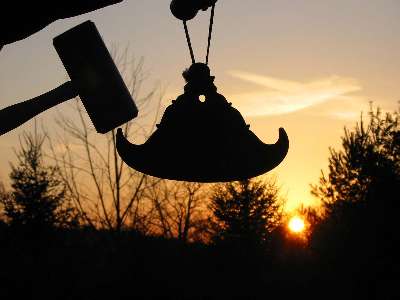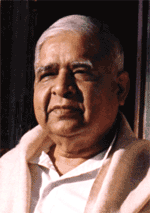A Journey to Panna: My Second Vipassana Retreat
 Recently I attended my second 10-day retreat and vow of Noble Silence at the Dhamma Dhara Vipassana Meditation Center in Shelburne Falls, Massachusetts. When I arrived at the center I was greeted with a flood of memories from my first retreat last year and the incredible spiritual journey I experienced with karmic guru SN Goenka (Goenka-ji).
Recently I attended my second 10-day retreat and vow of Noble Silence at the Dhamma Dhara Vipassana Meditation Center in Shelburne Falls, Massachusetts. When I arrived at the center I was greeted with a flood of memories from my first retreat last year and the incredible spiritual journey I experienced with karmic guru SN Goenka (Goenka-ji).
This year was different because Goenka-ji had given up his body not long after my first Vipassana experience last year. Hearing his booming chant, this year, knowing that he was in another dimension, was priceless. He was very much alive and fully present.
From 4 am to 4:30 am, your alarm clock is a gong banged by volunteers who serve. The meditation starts at 4:30 am–we meet in the meditation hall. The day ends at 9:30 p.m. Lights are out at 10 p.m. There are approximately 10 or 11 hours of sitting meditation in complete silence sandwiched in between. At times we heard chanting, but were forbidden from chanting ourselves.
Each day the true treat was the evening discourses delivered by Goenka-ji.
Before the retreat even starts, you have to adopt a certain code of conduct which included 5 strong precepts of the Vipassana technique:
- The rejection of killing – especially in what we eat
- No lying
- No stealing
- No sex
- No intoxicants.
In other words, the senses are not to be indulged at all. For the first 3 days of the retreat, we practiced anapana meditation. The purpose is to tranquilize the mind before embarking on the Vipassana technique on day 4.
- On Day 4, I meditated alone in a cell within a pagoda — a self-imposed jail. I did not have the big insight that I was hoping for, and yet, that was okay.
- Day 5 was fabulous and my ego, which was dormant, knocked on the door. It wanted to go home, because I thought I had achieved mastery of the technique.
- That big ‘A-ha’ moment arrived during the afternoon of day 6 after mud wrestling with my ego. The concept of non-duality is one that I have known for over a decade, and though I understood it intellectually, it was only on day 6 that I experienced it at the cellular level.
Let me tell you what I mean. For example:
 If you can watch sensations come and go, with equanimity (think of a mosquito bite and your urge to scratch it sooo badly), but you know that it will only make it itch more — so you just observe the sensations and don’t scratch it. Because that itch, too, shall pass.
If you can watch sensations come and go, with equanimity (think of a mosquito bite and your urge to scratch it sooo badly), but you know that it will only make it itch more — so you just observe the sensations and don’t scratch it. Because that itch, too, shall pass.
Similarly with your agitating (or itchy) thoughts, you can watch them come and go, without indulging them and being reactive or explosive. You can simply observe them, without attachment or aversion. They will, like clouds, disappear – sometimes those might be storm clouds!
Sitting in the pagoda then, I realized that nothing, and no one, could ever bother me.
As I continued, the connection between mind and body became more apparent. Buddha said, after years of living close to starvation as an ascetic, that one should take care of one’s body. I began to sense the quantum interaction between my mind and the sensations I was feeling in my physical form. My body may have ached from sitting in meditation for hours at a time, but I was determined to keep going, even as I suffered more and more.
Join me next time to discover what happened after day 6!
Be the Light and Be Light
Nobody escapes from suffering. We all go through birth, illnesses, death.
But there is a way to live life free of suffering.
– Buddha
I recently had the pleasure of attending a life-altering experience thanks to the compassionate and kind people at the Dhamma Dhara Meditation Center in Shelburne Falls, Massachusetts.
Led by accomplished karma-yogi S. N. Goenka, the retreat was an exercise in letting go. Letting go of my phone, my journal, my books, my ego and my life. About 100 other people and I had come for a week of silence — we each took a vow of silence. On that first day I never could have guessed where this journey would take lead me.
Day #1
The employees at meditation center confiscated all distractions, starting with our cell phones. I likened it to a doctor washing his or her hands before an operation; I had to get rid of all of the potential pathogens that could infect my mind. And this was indeed surgery of the mind.
DAY #2
Day #2 was not good for me at all. I became tearful and I wept inconsolably. At the same time I experienced such a strong anger, anger at myself — for being too competitive and for not knowing what I was looking for.
What was I looking for?
Day #3
Day #2 was bad, but day #3 was extremely bad- bad beyond bad. Every single bone in my body ached from sitting for so long. Nevertheless, I did my duty and sat in silence while my mind was restless.
 I found myself dreaming of ways to escape. Since I love to climb trees, I had thoughts of finding a good tree and jumping off of it to intentionally hurt myself. So I found the right tree and I started climbing. Once up there I realized how foolish it would be to hurt myself. What would I say to a student who wanted to hurt herself?
I found myself dreaming of ways to escape. Since I love to climb trees, I had thoughts of finding a good tree and jumping off of it to intentionally hurt myself. So I found the right tree and I started climbing. Once up there I realized how foolish it would be to hurt myself. What would I say to a student who wanted to hurt herself?
Obviously I had forgotten everything, all the tools that I teach, my coaching techniques, they all went down the toilet.
Day #4
Finally, I started coming to my senses. My unquiet thoughts started disappearing and I began to understand what the Vipassana method is; it is a technique of being totally aware and using breathing techniques as my guide. I decided I was going to learn the method and leave behind my knowledge of other schools and disciplines. I would get through this by being nothingness.
Day #5
As Goenkaji said, even when you’ve retired to your room, you can continue with the method. Well I started having dreams about my mother, my grandmother and all my relatives who I adore so much. I was basically continuing the method even in my sleep.
It was on the fifth day that I started feeling some healing in my body. This brought back memories of a dear friend who was fighting breast cancer (Spoiler alert: She won!). She said that during her chemo sessions she was able put her best foot forward because she knew that there is a higher power that heals.
If I had to choose one word to describe Day #5, it would be “Fabulous.”
Day #6
Day #6 was just OK. Half good and half bad. I confronted many feelings that day, not all of them pleasant. I got to thinking about my three sons and how I might have done some things differently. I felt like I may have created unnecessary suffering for my boys, that I failed them in some sense and that’s when the tears came back.
Day #7 and Day #8 were wonderful. Total bliss.
I did however, begin to experience anxiety because it was almost time to go back home. I didn’t want it to end. I had forgotten my life, my kids, my spouse, my job and who I was exactly. I just wanted to stay in that place and just do nothing and be nothing because being nothing feels so good.
And on the last day when we were finally allowed to talk I heard people say “Oh my god, I did it!” But I still didn’t want to talk, I just wanted to remain that quiet — at least until another student told me that I had been her source of inspiration! No wonder I love teaching so much.
Getting back to that life I led before attending this retreat wasn’t as difficult as I thought it would be, especially when my husband and youngest son greeted me with the most beautiful bouquet of flowers I have ever seen. It was Mother’s Day and I was totally present for it.
Oh my god, I thought, every single person should have this experience.
Forgiveness
 I often hear from coachees: I feel like I’m punch-drunk from growing up with my parents. When will I forget my childhood?
I often hear from coachees: I feel like I’m punch-drunk from growing up with my parents. When will I forget my childhood?
When you come to me with your boxing gloves on, fresh from a battle with life, it might be difficult for you to see that your gloves are actually removable. They may have served you very well, protecting you from the hard, often hostile world around you. As a retired “boxer” I’m here to tell you there’s an easier way.
During our childhoods we develop a storyline that becomes our “operating program”. This is the program that will parse out our lives, feeding us instructions and processing the way we interact with ourselves and other people. Any sort of abuse or neglect which occurred to us as children has a way of embedding itself deep in our hearts and subconscious minds. Unfortunately, more often than not, we do not realize we are carrying these non-loving feelings around with us. (more…)


